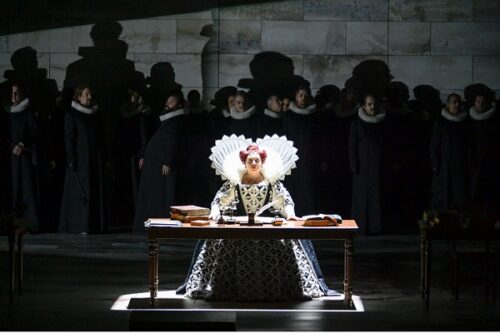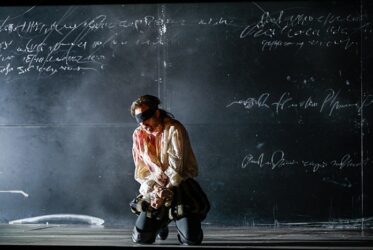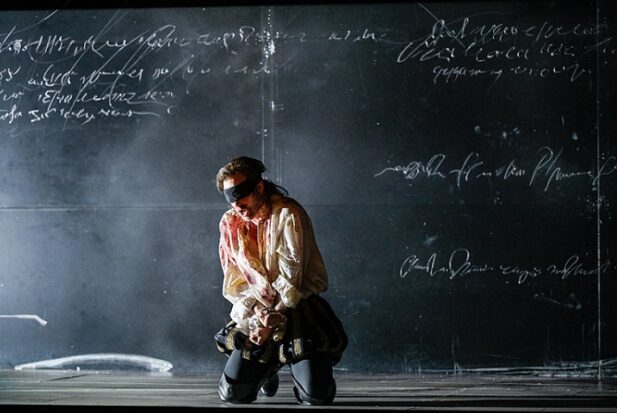 Switzerland Donizetti, Roberto Devereux: Soloists, Chorus of Zurich Opera, Philharmonia Zurich / Enrique Mazzola (conductor). Zurich Opera, 4.2.2023. (MF)
Switzerland Donizetti, Roberto Devereux: Soloists, Chorus of Zurich Opera, Philharmonia Zurich / Enrique Mazzola (conductor). Zurich Opera, 4.2.2023. (MF)

Production:
Director – David Alden
Set and Costumes – Gideon Davey
Lighting – Elfried Roller
Assistant choreographer – Arturo Gama
Chorus master – Janko Kastelic
Dramaturgy – Kathrin Brunner
Cast:
Elizabeth I – Inga Kalna
Duke of Nottingham – Konstantin Shushakov
Sara, Duchess of Nottingham – Anna Goryachova
Robert Devereux – Stephen Costello
Lord Cecil – Andrew Owens
Sir Walter Raleigh – Brent Michael Smith
Page – Aksel Daveyan
Nottingham’s confidant – Gregory Feldmann
Executioner – Francesco Guglielmino
The evening kicks off with a veritable coup de théâtre. Bang on the first upbeat, the spotlight is on the freshly beheaded Anne Boleyn with the very young Elizabeth looking on, a child alone on the wide-open stage. During the overture director David Alden illustrates the hardships of the future Queen Elizabeth I’s early years – a tough life as a ‘spare’ to her half-sister Mary Tudor – culminating in her almost grotesque posturing as crowned ruler in full regalia.
The real Elizabeth I reigned for 45 years, becoming known for her wit and infamous for her temper. She mastered the art of perfecting her image as the ‘Virgin Queen’, married to the English people rather than a man of flesh and blood, which, in reality, was perfectly compatible with a great number of love affairs.
The opera focuses on the end of the relationship between the aging Queen Elisabetta (Elizabeth) and her young lover, army commander Roberto (Robert) Devereux. Robert faces a sentence for having disobeyed Elizabeth’s orders. She delays the verdict out of love for him. Upon learning of Robert’s amorous betrayal – a passionate relationship with Sara, Duchess of Nottingham and wife of Robert’s best friend – Elizabeth signs his death sentence, only to regret it immediately. She renounces the throne and, at least metaphorically, life – ‘non regno, non vivo’. The Crown goes to James VI of Scotland (son of Mary Queen of Scots).
Donizetti composed this tragedia lirica at a time when his life had hit rock bottom. Having lost in the space of a year his parents, his two children and his wife, he mustered the energy to create his 57th opera. Roberto Devereux premiered in Naples in 1837 at the Teatro San Carlo. Like the plot, the score is bursting with drama. Its punch and emotional urgency had an audible influence on Giuseppe Verdi. Roberto Devereux is, with Anna Bolena and Maria Stuarda, the third opera in what is today referred to as the ‘Tudor Trilogy’, although not planned as such by Donizetti. In conductor Enrique Mazzola’s words, they form the ‘Donizetti Ring’.
David Alder has now staged the trilogy in Zurich, this Devereux was preceded by Maria Stuarda in 2018 and Anna Bolena 2021. The three are held together by a huge empty marble room as a scenic parenthesis. In Roberto Devereux, the action is structured by a circular wall separating open from closed and private from public spaces. It also provides Elizabeth with a generously sized background for her Instagram-worthy obsession with self-portraits; her effigy even hangs in the Nottinghams’ bedroom. The set’s horror vacui-inducing height keeps reminding us that humans are not the measure of all things, after all. The staging’s simplicity is both contrasted and echoed by Gideon Davey’s costumes. Whereas the four main characters are clad in elaborate period dress, the chorus representing the people wears neutral, late-nineteenth century black and white costumes.

The piece is named after the tenor but the main character is unquestionably Elizabeth. Latvian soprano Inga Kalna gives her role debut in the part of this queen at the end of her life. Kalna’s versatile voice and raw acting tumble in an emotional polygon of assertive determination, majestic grandiosity (three cheers for that frilled lizard-collar dress), tender love and forlorn deprivation. We genuinely do care for her. Stephen Costello holds up well as Roberto. His multi-faceted voice is at its most touching when he is incarcerated after the death sentence, despairing in front of the lowered safety curtain doubling as prison wall. Costello is also moving in the preceding duet with Anna Goryachova as Sara. Goryachova was called upon shortly before the premiere to fill in and learned the part in just four days, wowing the audience with a poignant performance.
Enrique Mazzola directs the Philharmonia Zurich emphatically. If it weren’t too prosaic a metaphor, one might say that the orchestra follows the conductor as if he were operating a water-tap, in this instance dispensing an enthusing multi-layered, colourful and dynamic musical flow. Mazzola knows his Donizetti inside and out, keenly exploring the way this nineteenth-century maestro broke the rules of traditional bel canto. The public was enraptured, thanking the cast with a standing ovation.
Further performances are on 12, 17, 22, 26 February, 4, 7 and 17 March.
Michael Fischer
